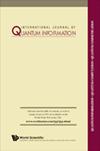An efficient combination strategy for hybrid quantum ensemble classifier
IF 0.7
4区 物理与天体物理
Q3 COMPUTER SCIENCE, THEORY & METHODS
引用次数: 0
Abstract
Quantum machine learning has shown advantages in many ways compared to classical machine learning. In machine learning, a difficult problem is how to learn a model with high robustness and strong generalization ability from a limited feature space. Combining multiple models as base learners, ensemble learning (EL) can effectively improve the accuracy, generalization ability and robustness of the final model. The key to EL lies in two aspects, the performance of base learners and the choice of the combination strategy. Recently, quantum EL (QEL) has been studied. However, existing combination strategies in QEL are inadequate in considering the accuracy and variance among base learners. This paper presents a hybrid EL framework that combines quantum and classical advantages. More importantly, we propose an efficient combination strategy for improving the accuracy of classification in the framework. We verify the feasibility and efficiency of our framework and strategy by using the MNIST dataset. Simulation results show that the hybrid EL framework with our combination strategy not only has a higher accuracy and lower variance than the single model without the ensemble, but also has a better accuracy than the majority voting and the weighted voting strategies in most cases.混合量子系综分类器的有效组合策略
与经典机器学习相比,量子机器学习在许多方面都显示出优势。如何从有限的特征空间中学习出具有高鲁棒性和强泛化能力的模型是机器学习中的一个难题。集成学习(EL)将多个模型作为基础学习器,可以有效地提高最终模型的准确率、泛化能力和鲁棒性。学习学习的关键在于两个方面:基础学习者的表现和组合策略的选择。近年来,人们开始研究量子电子效应(QEL)。然而,现有的QEL组合策略在考虑基学习器之间的准确率和方差方面存在不足。本文提出了一种结合量子和经典优势的混合EL框架。更重要的是,我们提出了一种有效的组合策略来提高框架中的分类精度。我们使用MNIST数据集验证了我们的框架和策略的可行性和有效性。仿真结果表明,采用组合策略的混合EL框架不仅比没有集成的单一模型具有更高的准确率和更低的方差,而且在大多数情况下也比多数投票和加权投票策略具有更好的准确率。
本文章由计算机程序翻译,如有差异,请以英文原文为准。
求助全文
约1分钟内获得全文
求助全文
来源期刊

International Journal of Quantum Information
物理-计算机:理论方法
CiteScore
2.20
自引率
8.30%
发文量
36
审稿时长
10 months
期刊介绍:
The International Journal of Quantum Information (IJQI) provides a forum for the interdisciplinary field of Quantum Information Science. In particular, we welcome contributions in these areas of experimental and theoretical research:
Quantum Cryptography
Quantum Computation
Quantum Communication
Fundamentals of Quantum Mechanics
Authors are welcome to submit quality research and review papers as well as short correspondences in both theoretical and experimental areas. Submitted articles will be refereed prior to acceptance for publication in the Journal.
 求助内容:
求助内容: 应助结果提醒方式:
应助结果提醒方式:


